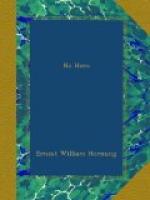“I deny nothing, and I’m proud of nothing, but neither am I quite so ashamed as perhaps I ought to be. Shall I tell you why, Mrs. Lascelles? It may have been an insolent and an infamous part, as you imply; but I enjoyed playing it, and I used often to forget it was a part at all. So much so that even now I’m not so sure that it was one! There—I suppose that makes it all ten times worse. But I won’t apologise again. Do you mind giving me that stick?”
I had rested the two of them against the chair between us. Mrs. Lascelles had taken possession of one, with which she was methodically probing the path, for there had been no time to draw their Alpine teeth. She did not comply with my request. She smiled instead.
“I mind very much,” her old voice said. “Now we have finished fighting, perhaps you will listen to the Meistersinger—for it is worth listening to on that band—and try to appreciate Baden while you are here. There are no more trains for hours.”
The wooded hills rose over the bandstand, against the bright blue sky. The shadow of the colonnade lay sharp and black beyond our feet, with people passing, and the band crashing, in the sunlight beyond. That was Baden. I should not have found it a difficult place to appreciate, a week or so before; even now it was no hardship to sit there listening to the one bit of Wagner that my ear welcomes as a friend, and furtively to watch my companion as she sat and listened too. You will perceive by what train of associations my eyes soon fell upon the Tauchnitz volume which she must have placed without thinking on the chair between us. I took it up. Heavens! It was one of the volumes of Browning’s Poems. And back I sped in spirit to a green ledge overlooking the Gorner Glacier, to think what we had said about Browning up there, but only to remember how I had longed to be to Mrs. Lascelles what Catherine Evers had been to me. There were some sharp edges to the reminiscence, but I turned the pages while they did their worst, and so cut myself to the heart upon a sharper than them all. It was in a poem I remembered, a poem whose title pained me into glancing farther. And see what leapt to meet me from the printed page:
“And I,—what I seem to
my friend, you see:
What I soon shall seem to
his love, you guess:
What I seem to myself, do you ask of me?
No hero, I confess.”
True, too true; no hero, indeed; anything in the wide world else! But that I should read it there by the woman’s side! And yet, even that was no such coincidence; had we not talked about the poet, had I not implied what Catherine thought of him, what everybody ought to think?
Of a sudden a strange thrill stirred me; sidelong I glanced at my companion. She had turned her head away; her cheek was deeply dyed. She knew what I was doing; she might divine my thoughts. I shut the book lest she should see the vile title of a thing I had hitherto liked. And the Prizelied crashed back into the ear.




